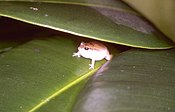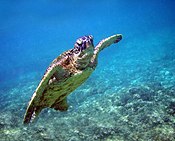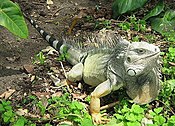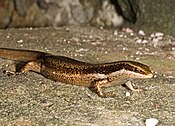List of amphibians and reptiles of Saint Vincent
Appearance


This is a list of amphibians and reptiles found on the island of Saint Vincent, located in the Caribbean Lesser Antilles. It is the main island of the nation Saint Vincent and the Grenadines.
Amphibians
There are four species of amphibian on Saint Vincent, one of which was introduced. One species, Eleutherodactylus shrevei, is endemic.
Frogs (Anura)
| Tropical frogs (Leptodactylidae) | |||
|---|---|---|---|
| Species | Common name(s) | Notes | Image |
| Eleutherodactylus johnstonei | Lesser Antillean whistling frog, coqui Antillano, Johnstone's whistling frog | Least concern.[1] | 
|
| Eleutherodactylus shrevei | Endangered. Endemic. Restricted to pristine montane forest. | ||
| Leptodactylus validus | Windward ditch frog | Least concern. Regional endemic. Typically found in forest habitats, but may venture into human-altered areas. | |
| True toads (Bufonidae) | |||
| Species | Common name(s) | Notes | Image |
| Bufo marinus | Cane toad, giant Neotropical toad, marine toad | Least concern. Introduced. | 
|
Reptiles
Including marine turtles and introduced species, there are 16 reptile species reported on Saint Vincent, three of which are endemic.
Turtles (Testudines)
| Scaly sea turtles (Cheloniidae) | |||
|---|---|---|---|
| Species | Common name(s) | Notes | Image |
| Caretta caretta | Loggerhead turtle | Endangered. | 
|
| Chelonia mydas | Green turtle | Endangered. | 
|
| Eretmochelys imbricata | Hawksbill turtle | Critically endangered. | 
|
| Leathery sea turtles (Dermochelyidae) | |||
| Species | Common name(s) | Notes | Image |
| Dermochelys coriacea | Leatherback turtle | Critically endangered. | 
|
Lizards and snakes (Squamata)
| Geckos (Gekkonidae) | |||
|---|---|---|---|
| Species | Common name(s) | Notes | Image |
| Hemidactylus mabouia | House gecko | Introduced. | 
|
| Sphaerodactylus vincenti | Vincent's least gecko | Regional endemic. | 
|
| Thecadactylus rapicauda | Turnip-tailed gecko | 
| |
| Iguanas and anolids (Iguanidae) | |||
| Species | Common name(s) | Notes | Image |
| Anolis griseus | Saint Vincent's tree anole | Endemic. Widely distributed from sea level to 900 m. | |
| Anolis trinitatis | Saint Vincent's bush anole, Trinidad anole | Regional endemic. Widely distributed from sea level to 900 m. | |
| Iguana iguana | Green iguana, common iguana | 
| |
| Microteiids (Gymnophthalmidae) | |||
| Species | Common name(s) | Notes | Image |
| Gymnophthalmus underwoodi | Underwood's spectacled tegu | ||
| Skinks (Scincidae) | |||
| Species | Common name(s) | Notes | Image |
| Mabuya mabouya[2] | Regional endemic. Possibly extirpated. | 
| |
| Boas (Boidae) | |||
| Species | Common name(s) | Notes | Image |
| Corallus cookii[3] | Cook's tree boa | Endemic. Found in many habitats, though uncommon in rain forest. | |
| Colubrids (Colubridae) | |||
| Species | Common name(s) | Notes | Image |
| Chironius vincenti | Saint Vincent blacksnake | Critically endangered. Endemic. Probably restricted to elevations between 150 and 330 m. | |
| Mastigodryas bruesi | Barbour's tropical racer | Regional endemic. Found in xeric habitats in the southwest. | |
Crocodilians (Crocodylia)
| Crocodiles (Crocodylinae) | |||
|---|---|---|---|
| Species | Common name(s) | Notes | Image |
| Crocodylus acutus | American crocodile | 
| |
See also
Notes
- ^ Conservation status, where available, is from the IUCN Red List and is indicative of the status of the species as a whole, not just populations on Saint Vincent.
- ^ Malhotra & Thorpe 1999 instead records M. bistriata as the sole Mabuya species in the Lesser Antilles; many of its Caribbean populations have since been reassigned.
- ^ Powell & Henderson 2005, p. 74. Malhotra & Thorpe 1999 reports the Saint Vincent species as Corallus hortulanus, of which it was formerly described as a subspecies.
References
Note: All species listed above are supported by Malhotra & Thorpe 1999, unless otherwise cited.
- Malhotra, Anita; Thorpe, Roger S. (1999), Reptiles & Amphibians of the Eastern Caribbean, Macmillan Education Ltd., pp. 98–103, ISBN 0-333-69141-5.
- Powell, Robert; Henderson, Robert W. (2005), "Conservation Status of Lesser Antillean Reptiles", Iguana, 12 (2): 63–77
